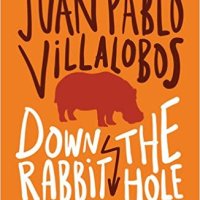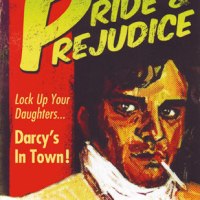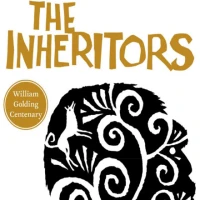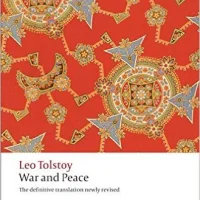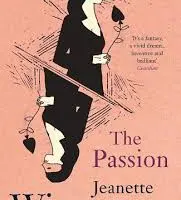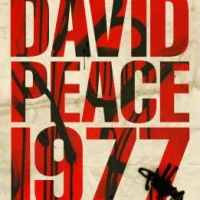War and Peace, by Leo Tolstoy (Maudes/Mandelker translation)
Where to start? Perhaps by saying this will be a long piece and will include some lengthy quotes.

First the obvious and perhaps not so obvious. War and Peace is a historical novel about the Napoleonic wars, written from the Russian perspective. Except that’s crudely reductionist, but I have to start somewhere. It explores Russia’s attempts to modernise, the impact of French and European culture on Russian society, and it explores the history of the period using fiction as an illustrative tool. It includes both war and peace, so it definitely lives up to the title.
Probe a little deeper and it becomes an essay on historical theory and a moral examination of how to live well in the knowledge of mortality and the uncertainty of the divine. Probe deeper, well, probe deeper and you get over a century’s academic analysis which I’ll happily leave you to. This isn’t the place for that.
For Tolstoy, the true interest of War and Peace was the implications of the history – the problem of free will and “the question of how man’s consciousness of freedom is to be reconciled with the law of necessity to which he is subject”. For the reader, for this reader anyway, the interest is the characters. So many characters, so many of them so very memorable.
General thoughts
I just mentioned characters, and the first to appear are happily a couple of my favourites even though neither is terribly central to the narrative. Tolstoy opens with a dialogue paragraph written almost entirely in French forecasting war and comparing Napoleon to the antichrist:
‘Eh bien, mon prince, Génes et Lucques ne sont plus ques des apanages, des family estates de la famille Buonaparte. Non, je vous Préviens, qui si vous ne me dites pas, que nous avons la guerre, si vous vous permettez encore de pallier toutes les infamies, toutes les atrocités de cet Antichrist (ma parole, j’y crois) – je ne vous connais plus, vous n’étes pas plus my faithful slave, comme vous dites. Well how do you do? How do you do? Je vois que je vous fais peur – sit down and tell me all the news.’
It was in July 1805, and the speaker was the well-known Anna Pavlovna Scherer, maid of honour and favourite of the Empress Marya Fyodorovna. With these words she greeted Prince Vasili, a man of high rank and importance, who was the first to arrive at her reception. Anna Pavlovna had had a cough for some days. She was, as she said, suffering from la grippe; grippe being then a new word in St Petersburg, used only by the élite.
It’s a bold opening. I appreciate most contemporary readers would have spoken French, but even so to open your book with text in a foreign language takes some confidence. The conversation continues with each of Anna Pavlovna and Prince Vasili dipping in and out of French as the mood and mot juste strikes them.
What follows over the next 1,300 or so pages is society parties, family intrigues, a rather wonderful sequence involving a last-minute change of will by one of the richest men in Russia, love affairs, loveless marriages and matches of the heart, children’s games, a duel, military marches, battles, childbirth, death, Freemasonry, court politics, financial struggles, family disputes, I exhaust myself trying to catch even a fraction of it. Life is in here. All of it.
Minor subplots here could be the entire subject of another novel. That episode I mention involving the will? Here that’s a few pages with Prince Vasili discovering that a fortune he expected to be his may be left to a literal bastard upstart by name Pierre who has all the society graces of a pet pig. As relatives gather in the gloomy immensity of the dying count’s palace schemers hurry through the halls hoping to preserve or make disappear the new will presumed to be in Pierre’s favour. It’s probably my favourite moment of the entire book, but here it’s a minor incident included primarily to set up Pierre’s situation for later in the novel.
By my count there’s approximately five major characters in War and Peace: the rather Darcy-esque Prince Andrei and his virtuous and much put-upon sister Masha; the delightful young Natasha Rostov and her brother the dashing young Nikolai Rostov; and naive but ever-enthusiastic Pierre. None of them are overly nuanced, this is a novel of broad sweep rather than fine detail, but they’re all pleasant to spend time with.
Around each of these characters is a bevy of relatives and close associates. The major characters often have to bear the brunt of carrying the novel’s ideas, particularly Prince Andrei and Pierre, but the minor ones are free of that and perhaps in consequence much of what I liked best was characters who actually weren’t that important to the wider story.
Prince Andrei’s and Princess Marya’s father, Prince Bolkonsky is one example. He’s an irascible but still energetic old man with a routine so fixed that at any moment of the day he can be certain precisely what he’s due to do. He’s argumentative and proud and sometimes cruel and just rather wonderfully drawn. It’s a slight stretch to say that he isn’t important to the wider story as he actually comes up a fair bit, but he’s certainly not a central figure.
Perhaps a better example is Berg, a friend of the Rostov family who becomes an army officer and pops up in the narrative from time to time. He’s an incredibly self-absorbed man interested in nothing beyond himself and convinced that everyone else is equally interested, but good natured with it so that nobody ever particularly holds it against him. I loved Berg, he’s terribly funny, and a tremendous little character portrait as is his eventual wife Vera Rostova ((Nikolai’s older sister) who though pretty and clever is somehow unlikeable in a way never quite easy to pin down.
Tolstoy is simply brilliant at these miniature portraits (some not so miniature, Prince Bolkonsky gets enough space to fill a decent novella but in the context of W&P he’s still very much a supporting role). When the book’s at its best it hums with life because they’re all so distinct. There’s a point here – this isn’t a realistic novel because realistically all these people wouldn’t be so clearly distinguishable. It’s art, and Tolstoy helps his reader navigate the fiction by making sure nobody fades into the background save precisely when he wants them to.
Tolstoy helps the reader. Russian doesn’t. You may have wondered who that Princess Marya was I mentioned a few paragraphs back. She’s the same person as the Masha I mentioned. Worse, both Nikolai Rostov and his father Ilya Rostov are counts and while the book sometimes refers to the old count to make it clear who’s being discussed there were times it simply referred to Count Rostov and left you to try to work out from context which one it was.
Russians love nicknames and almost everyone has a title, the result being that it’s quite easy to be reading a scene only suddenly to realise that what you thought was the young count is actually the old count or worse (and this happened to me once) that Platón and Karatáev are actually the same person (Tolstoy didn’t actually help there, as while the character had been introduced originally as Platón Karatáev there’s a section a 100 pages or so later where Tolstoy alternately refers in the same paragraphs to Platón and then to Karatáev creating a very real impression that they’re different people).
Bookmark the sensibly provided guide to characters at the front of the book. You’ll be referring to it often.
Peace
The book opens with peace and I’ve already included an apposite quote above. If you’ve read any fiction depicting the landed gentry and aristocracy pretty much anywhere in the 19th or pre-WW1 20th Century then you know what to expect – balls, dinner parties, salons, money and beauty and wit as the criteria of worth. As ever, inheriting wealth makes up for any number of social flaws and marriage remains the only reliable route out of poverty even for well-born women.
Position, maintaining it and improving it, is the chief focus for society people. As is common in 19th Century fiction for most the spectre of ruin is never that far away. A bad run at cards, a tendency not to keep track of how much you’re spending on carriages and grand hunts, and before you know it you could find yourself little more than a well-dressed beggar dependent on charity. The aged Princess Anna Mikhailovna is an example of what can happen – her financial capital long since exhausted and her social capital evaporating with it, she spends her days lurking in corridors asking favours from the powerful on behalf of her son Boris.
Proximity to the court means proximity to power and route to promotion. Prince Vasili takes pity on poor Anna Mikhailovna and sees that her son gets appointed to the prestigious Guards’ regiment. Boris becomes an adjutant, begins to mix with generals and before long his career is soaring. All it took was that proximity his mother had lost.
As some rise, others fall. The old count Rostov has no head for money and as the book progresses the Rostov family’s finances become steadily worse. If the young count marries an heiress they’ll be saved, but marrying for money is dishonourable and he’s promised himself to a gently-born but poor girl who’s herself already dependent on the family. His honour could ruin his family.
I love this kind of material. In one chilling scene a supposed friend (the calculatedly cruel Dolokhov, another of Tolstoy’s masterful minor character portraits) systematically destroys young Nikolai Rostov leaving him with a debt he can never repay. That leaves Rostov a choice between suicide and borrowing from his father, all as the family sinks ever further into debt.
Dolokhov manipulates men into duels knowing that with his icy calm he will almost certainly win, so killing men for no reason other than his own entertainment. He gets bumped down to the ranks but his courage in combat quickly sees him promoted again. He’s a tiger where young Rostov is a loyal and friendly borzoi. Peace isn’t necessarily safer than war.
Masha is kept from marriage by her loyalty to her father and desire not to abandon him, and anyway by his seclusion which prevents her meeting any marriageable men. She is desperate and lonely, taking solace in charity and religion and denied any chance to participate in wider society.
Natasha by contrast is a society natural: beautiful, vivacious, a marvellous dancer and fine singer. Tolstoy does for her in the epilogue suddenly transforming her character into a homebody to make a rather dubious point about women’s empowerment and why they don’t need it, but until then she’s one of the most likable characters in the book.
Pierre meanwhile becomes involved with the Freemasons, seeking after a meaning to life he’d already tried and failed to find in politics. From there his adventures in philosophy continue as he bumbles along trying to free his serfs (never realising he didn’t actually manage to do so) and to do good in the world. Young Rostov rarely thinks; Pierre does little else. Neither approach makes much difference to the world which is too large to be moved by any one man (one of Tolstoy’s key themes in fact).
Tolstoy is marvellous too at social undercurrents. One of the book’s funniest scenes takes place when Natasha goes to her first opera. She understands nothing:
THE floor of the stage consisted of smooth boards, at the sides was some painted cardboard representing trees, and at the back was a cloth stretched over boards. In the centre of the stage sat some girls in red bodices and white skirts. One very fat girl in a white silk dress sat apart on a low bench, to the back of which a piece of green cardboard was glued. They all sang something. When they had finished their song the girl in white went up to the prompter’s box, and a man with tight silk trousers over his stout legs, and holding a plume and a dagger, went up to her and began singing, waving his arms about.
First the man in the tight trousers sang alone, then she sang, then they both paused while the orchestra played and the man fingered the hand of the girl in white, obviously awaiting the beat to start singing with her. They sang together and everyone in the theatre began clapping and shouting, while the man and woman on the stage—who represented lovers—began smiling, spreading out their arms, and bowing.
While the comedy continues Tolstoy reintroduces Anatole Kuragin, a handsome seducer seen earlier in the book. Natasha has never encountered anyone like him before, has no idea of the danger he represents. She’s defenceless, and as reader I found myself laughing at her reaction to the opera while at the same time fearing for Natasha when faced with such a practiced gallant. Here he makes his entrance:
He was now in an adjutant’s uniform with one epaulette and a shoulder-knot. He moved with a restrained swagger which would have been ridiculous had he not been so good-looking and had his handsome face not worn such an expression of good-humoured complacency and gaiety.
Though the performance was proceeding, he walked deliberately down the carpeted gangway, his sword and spurs slightly jingling and his handsome perfumed head held high.
Whose head wouldn’t be turned? As I said above, sometimes peace is more dangerous than war. Tolstoy is ever alive to the parallels between the two – Karagin mounting his campaign on Natasha’s defences as Bonaparte does on Russia’s.
War
What is it good for? Well, to be fair to Tolstoy it’s good for some of the most thrilling battle scenes I’ve read in fiction. Later in the book the war sections become pretty awful as Tolstoy increasingly just lectures the reader directly on his theories, but before then they are at times quite staggeringly good. The following is one of my favourite scenes from the book (though still behind the shenanigans with the disputed will I mentioned earlier). The he in this passage is young Nikolai Rostov who is carrying a dispatch:
He was riding almost along the front line. A handful of men came galloping towards him. They were our Uhlans who with disordered ranks were returning from the attack. Rostov got out of their way, involuntarily noticed that one of them was bleeding, and galloped on.
‘That is no business of mine,’ he thought. He had not ridden many hundred yards after that before he saw to his left, across the whole width of the field, an enormous mass of cavalry in brilliant white uniforms, mounted on black horses, trotting straight towards him and across his path. Rostov put his horse to full gallop to get out of the way of these men, and he would have got clear had they continued at the same speed, but they kept increasing their pace, so that some of the horses were already galloping. Rostov heard the thud of their hoofs and the jingle of their weapons and saw their horses, their figures, and even their faces, more and more distinctly. They were our Horse Guards, advancing to attack the French cavalry that was coming to meet them.
The Horse Guards were galloping, but still holding in their horses. Rostov could already see their faces and heard the command: ‘Charge!’ shouted by an officer who was urging his thoroughbred to full speed. Rostov fearing to be crushed or swept into the attack on the French, galloped along the front as hard as his horse could go, but still was not in time to avoid them.
The last of the Horse Guards, a huge pock-marked fellow, frowned angrily on seeing Rostov before him, with whom he would inevitably collide. This Guardsman would certainly have bowled Rostov and his Bedouin over (Rostov felt himself quite tiny and weak compared to these gigantic men and horses) had it not occurred to Rostov to flourish his whip before the eyes of the Guardsman’s horse. The heavy black horse, sixteen hands high, shied, throwing back its ears; but the pock-marked Guardsman drove his huge spurs in violently, and the horse flourishing its tail and extending its neck, galloped on yet faster. Hardly had the Horse Guards passed Rostov before he heard them shout, ‘Hurrah!’ and looking back saw that their foremost ranks were mixed up with some foreign cavalry with red epaulettes, probably French. He could see nothing more, for immediately afterwards cannon began firing from somewhere and smoke enveloped everything.
Phew! I’ve rarely read something more cinematic. Tolstoy had seen action himself and it shows. War here is messy, bloody, and above all confusing. Situation updates arrive at headquarters too late to be actioned; orders reach the front long after they’ve become irrelevant to a changed situation. Smoke clouds the field and men advancing to what they think is a safe position find themselves suddenly in battle while others fail to see the enemy all day.
Rostov and Prince Andrei both go to their first battle filled with dreams of glory, as later do other characters. Rostov finds it without doing very much of anything. Prince Andrei leads a charge and captures an enemy standard but nobody of consequence particularly notices. Everywhere is chaos and the cost paid for these bits of captured cloth is horrific.
Two more (I’m afraid lengthy) quotes now to illustrate. The first is from a Russian retreat which goes wrong as the soldiers find themselves logjammed as they seek to flee enemy guns:
The general on horseback at the entrance to the dam, raised his hand and opened his mouth to address Dolokhov. Suddenly a cannon-ball hissed so low above the crowd that everyone ducked. It flopped into something moist, and the general fell from his horse in a pool of blood. Nobody gave him a look or thought of raising him.
‘Get onto the ice, over the ice! Go on! Turn! Don’t you hear? Go on!’ innumerable voices suddenly shouted after the ball had struck the general, the men themselves not knowing what, or why, they were shouting.
One of the hindmost guns that was going onto the dam turned off onto the ice. Crowds of soldiers from the dam began running onto the frozen pond. The ice gave way under one of the foremost soldiers, and one leg slipped into the water. He tried to right himself but fell in up to his waist. The nearest soldiers shrank back, the gun-driver stopped his horse, but from behind still came the shouts: ‘Onto the ice, why do you stop? Go on! Go on!’ And cries of horror were heard in the crowd. The soldiers near the gun waved their arms and beat the horses to make them turn and move on. The horses moved off the bank. The ice, that had held under those on foot, collapsed in a great mass, and some forty men who were on it dashed, some forwards and some back, drowning one another.
In this second quote a regiment has been told to hold its ground in case needed, neither advancing nor retreating. They are under direct enemy fire, but cannot move in case needed, which they never are.
Without moving from that spot or firing a single shot the regiment here lost another third of its men. From in front and especially from the right, in the unlifting smoke the guns boomed, and out of the mysterious domain of smoke that overlay the whole space in front, quick hissing cannon-balls and slow whistling shells flew unceasingly. At times, as if to allow them a respite, a quarter of an hour passed during which the cannon-balls and shells all flew overhead, but sometimes several men were torn from the regiment in a minute, and the slain were continually being dragged away and the wounded carried off.
With each fresh blow less and less chance of life remained for those not yet killed. The regiment stood in columns of battalion three hundred paces apart, but nevertheless the men were always in one and the same mood. All alike were taciturn and morose. Talk was rarely heard in the ranks, and it ceased altogether every time the thud of a successful shot and the cry of ‘stretchers!’ was heard. Most of the time, by their officers’ order, the men sat on the ground. One, having taken off his shako carefully loosened the gathers of its lining and drew them tight again; another, rubbing some dry clay between his palms, polished his bayonet; another fingered the strap and pulled the buckle of his bandolier, while another smoothed and refolded his leg-bands and put his boots on again. Some built little houses of the tufts in the ploughed ground, or plaited baskets from the straw in the cornfield. All seemed fully absorbed in these pursuits.
I enjoyed the peace more than the war but that’s simply a question of personal interest. Tolstoy writes exceptional military fiction when he turns his hand to it.
Sadly in the last fifth of the book war increasingly squeezes out peace and Tolstoy increasingly comes to prefer directly addressing the reader to scenes of the sort above. It’s fair to say that War and Peace sags badly in the final section and for me became something of a chore to read until, gratefully and wearily, I reached the first epilogue where it mercifully (but only partly) recovered. This is a book you read very much for the journey rather than the destination.
The wolf hunt
Tolstoy brings war and peace together in a central chapter the importance of which initially escaped me. The Rostovs go on a winter wolf hunt, a vast affair featuring hundreds of dogs, scores of men (and Natasha), horses and carriages and significant expense. I couldn’t select a single quote from this section as the density of description increases dramatically, Tolstoy really taking you into the hunt.
It’s a well-described episode and everything about it rings true, but while reading it I did rather wonder why it was there since it’s lengthy even by War and Peace standards and didn’t seem to add much to what I already knew about the characters. Later, however, as Bonaparte’s fortunes turn the parallels become evident.
In peace the men prepare for war in part by riding to hunt, organising themselves to ensure their prey does not elude them and commanding packs of dogs as in battle they’ll command their men. In war the defeated Bonaparte seeks to outrun the Russians harrying him back from Moscow as packs of partisans harry and diminish his forces.
A battlefield and a ball have this in common – they are both social constructs, created by people with gains to be made and losses hopefully to be avoided. A battle may yield a captured standard, the notice of a general or prince, promotion and favour; a ball may yield a marriage, praise for a clever quip, an introduction to those of higher station.
The parallels are not of course exact. Few people die at balls. But then, few of the adjutants and hangers-on at the front die either. Princess Anna Mikhailovna’s son Boris doesn’t make the progress he does by riding into enemy fire but by running errands for generals.
Serfdom
The wolf hunt brings out one other parallel which struck me, and perhaps a less appealing one. The hunters have their packs of borzoi, among which typically are a few dogs of particular note and value.
Similarly each of the characters has their serfs, sometimes thousands or even tens of thousands of them. In the main serfs are an asset, an undifferentiated mass from which you generate revenue. Some serfs however have unusual talents, such as Taras for whom the Rostovs paid a thousand rubles due to his gift for cookery. For that they could have purchased eight to ten ordinary serfs, but his talents enhance their dinner parties and so he is worth the cost.
Serfs are, in short, slaves. They are property, bought and sold. Sometimes the characters are fond of particular named serfs, but in the same way they are fond of particular named dogs. It doesn’t mean they see them as people.
Society was as it was and it’s pointless now to condemn fictional characters for quite ordinary behaviour in their setting. However, the writing does occasionally fall into the slightly uncomfortable trap of showing smiling serfs (slaves) looking adoringly on at their masters without any sense of their having their own interiority. Tolstoy gets people, but it’s not entirely clear here that he gets the serfs as being people in the same way the other characters are. A couple of examples:
As soon as the provocatively gay strains of Daniel Cooper (somewhat resembling those of a merry folk dance) began to sound, all the doorways of the ballroom were suddenly filled by the domestic serfs—the men on one side and the women on the other—who with beaming faces had come to see their master making merry.
…
His means increased rapidly: serfs from neighbouring estates came to beg him to buy them, and long after his death the memory of his administration was devoutly preserved among the serfs. ‘Now that was a master … the peasants’ affairs first and then his own. But he never gave in to us—in a word, he was a real master!’
It’s not really a flaw because this isn’t a book about the serfs and none of the characters would ever give them much consideration (save Prince Andrei, who quietly and efficiently frees his without fuss). It would ultimately be odd if Tolstoy had a serf with the agency of a Pierre or Natasha. However, the parallels between dogs and serfs did help explain why fifty years after this book was first published the system it portrays was so decisively destroyed.
History
Finally, from a minor criticism to a major one. The history. I’ve already mentioned it more than once, but it is deathly. Initially it’s the odd aside, but near the end of the book it’s page after page after page of tedious historical argument generally made against unnamed “historians” with whom Tolstoy has some pedantic point to prove. Here’s an example:
THIS campaign consisted in a flight of the French during which they did all they could to destroy themselves. From the time they turned onto the Kaluga road to the day their leader fled from the army, none of the movements of the crowd had any sense. So one might have thought that of this period of the campaign the historians, who attribute the actions of the mass to the will of one man, would have found it impossible to make the story of the retreat fit their theory. But no! Mountains of books have been written by the historians about this campaign, and everywhere Napoleon’s arrangements are described, the manoeuvres, and his profound plans which guided the army, as well as the military genius shown by his marshals.
The retreat from Malo-Yaroslavets when he had a free road into a well-supplied district and the parallel road was open to him along which Kutuzov afterwards pursued him—this unnecessary retreat along a devastated road—is explained to us as being due to profound considerations. Similarly profound considerations are given for his retreat from Smolensk to Orsha. Then his heroism at Krasnoe is described, where he is reported to have been prepared to accept battle and take personal command and to have walked about with a birch stick and said:
‘J’ai assez fait l’empereur; il est temps de faire le général,’1 but nevertheless immediately ran away again, abandoning to its fate the scattered fragments of the army he left behind.
Then we are told of the greatness of soul of the marshals, especially of Ney—a greatness of soul consisting in this: that he made his way by night round through the forest and across the Dnieper, and escaped to Orsha abandoning standards, artillery, and nine-tenths of his men.
And lastly, the final departure of the great Emperor from his heroic army is presented to us by the historians as something great and characteristic of genius. Even that final running away, described in ordinary language as the lowest depth of baseness which every child is taught to be ashamed of—even that act finds justification in the historians’ language.
When it is impossible to stretch the very elastic threads of historical ratiocination any farther, when actions are clearly contrary to all that humanity calls right or even just, the historians produce a saving conception of ‘greatness’. ‘Greatness’, it seems, excludes the standards of right and wrong. For the ‘great’ man nothing is wrong; there is no atrocity for which a ‘great’ man can be blamed.
‘C’est grand!’ say the historians, and there no longer exists either good or evil, but only ‘grand’ and ‘not grand’. Grand is good, not grand is bad. Grand is the characteristic, in their conception, of some special animals called ‘heroes’. And Napoleon escaping home in a warm fur coat and leaving to perish those who were not merely his comrades but were (in his opinion) men he had brought there, feels que c’est grand, and his soul is tranquil.
There’s not quite an ocean of this stuff, but definitely a decent sized sea. At times it feels like score settling in a dispute of which I know nothing and care less, as here:
All that strange contradiction, now difficult to understand, between the facts and the historical accounts, only arises because the historians dealing with the matter have written the history of the beautiful words and sentiments of various generals, and not the history of the events. To them the words of Miloradovich seem very interesting, and so do their surmises, and the rewards this or that general received; but the question of those fifty thousand men who were left in hospitals and in graves does not even interest them, for it does not come within the range of their investigation.
I don’t even particularly disagree, but who are these “them” who are claimed to be so uninterested in fifty thousand men injured or dead? It’s always easy to rail against an unspecified opponent who by virtue of their anonymity never has an opportunity to rebut.
The historical passages come pretty close to killing the book, and I absolutely urge you not to read the second epilogue which is literally nothing but historical theory and comes after a rather affecting first epilogue which neatly captures many of the book’s major themes (albeit also crudely and unconvincingly transforming Natasha’s character as I mentioned above).
There’s a common criticism of War and Peace best summarised by Henry James, who called it ‘a loose, baggy monster’. I have some sympathy with that. There is in fact considerable structure here, but the sheer size of the book tends to mean it’s difficult to keep sight of and parallels and themes get lost in sheer volume.
And yet, and yet. I finished it with a mood of boredom and frustration, but it stays in the memory. The characters are with me yet. The history, mercifully, fades. The rest remains. At risk of blasphemy it could have used an editor with a bright red pen to strike out much of the theory which Tolstoy would have done better to publish as separate essay, but the book’s lasted well enough so who am I to say it should have been done differently?
The use of French
I’ll end with one final observation. Some translations convert the French passages to English. That’s a mistake. It’s a mistake that could easily be fixed by translating the French to English but italicising it to make it clear when French is being spoken, but it is important to know which language the characters are using and when.
As I said above, this is not a realistic work. Language here denotes character. Early on Pierre speaks little to no French marking his lack of sophistication. Around him are society figures who use little else, cosmopolitans who see him as painfully earnest and rather comical. Later as he loses his way for a while he comes to speak French frequently, his linguistic gain mirroring his moral loss.
As the war develops French becomes unfashionable and is less used, but some characters never quite abandon it. Society beauty Helene Kuragin uses it throughout, in keeping with her amorality and self-absorbed carnality. Natasha speaks French only once – at the opera when her innocence is most at peril from Anatole Kuragin’s practiced experience (I have the introduction to thank for that observation).
French here is not just a language, it’s an indication of character. The virtuous speak Russian, the sophisticated speak French. France’s physical invasion followed a cultural invasion.
Tolstoy is never anti-French, but he is pro-Russian. The problem here is not the adoption of a few French phrases, but the adoption by some of Russia’s elite of a morality alien to the Russian soul. Translate Russian and French equally into English and you lose that. The differentiation between the two is vital.
Wrapping up
Perhaps fittingly, this is if not the longest then certainly among the longest pieces I’ve ever written here. If you made it this far (without skimming), congratulations, you’re ready to read War and Peace. I’ll see you in a couple of months…
Other reviews
None I know of, but I would flag to you these excellent pieces by Tom at Amateur Reader: here where he describes the challenge the book sets itself; here and here where he makes a very compelling comparison to Victor Hugo (though Hugo’s much better at the essayistic stuff in my view); here where he talks about style and point of view; and above all here where he analyses the wolf hunt. He also discusses death in War and Peace here, though be warned that piece does involve a spoiler regarding a character death (though I guessed what was coming in the book pages in advance and I suspect most other readers will also).
Please let me know of other interesting posts in the comments.











